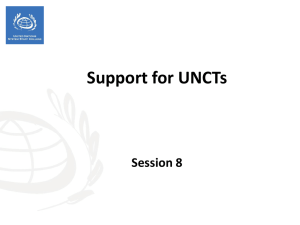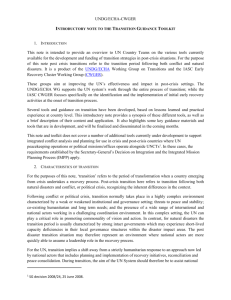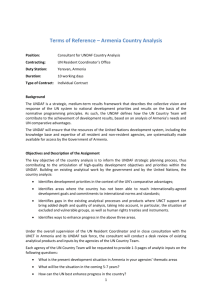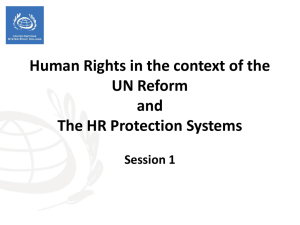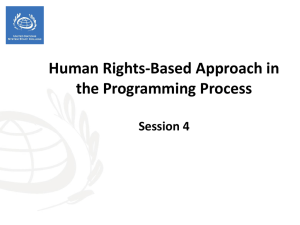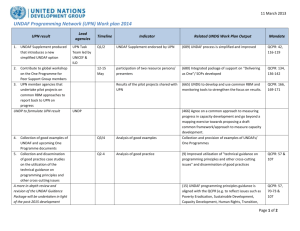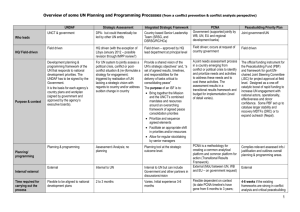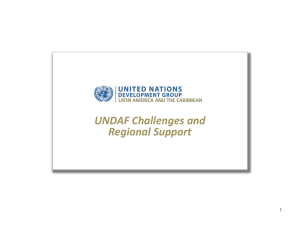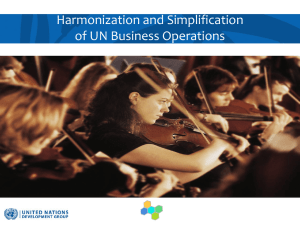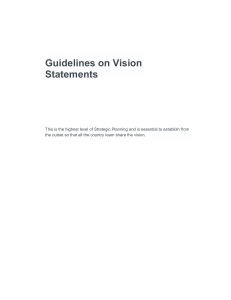Matrix of Issues and Guidance
advertisement
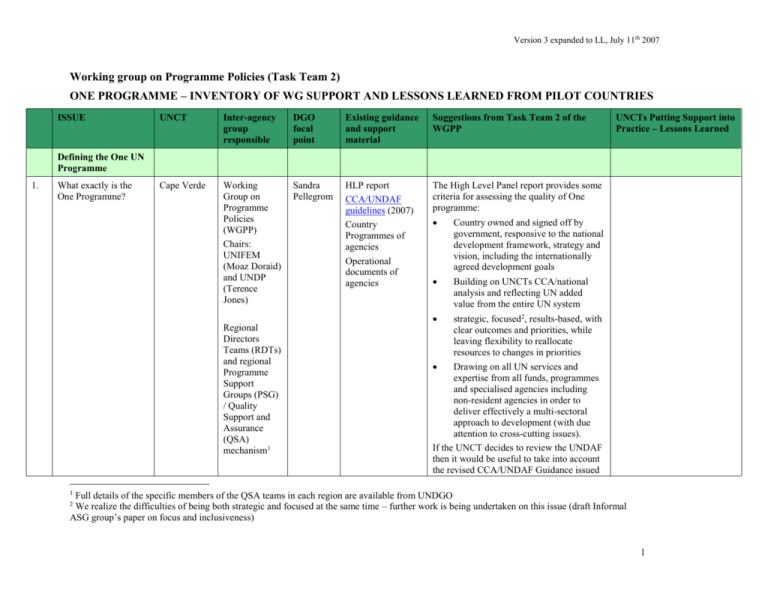
Version 3 expanded to LL, July 11th 2007 Working group on Programme Policies (Task Team 2) ONE PROGRAMME – INVENTORY OF WG SUPPORT AND LESSONS LEARNED FROM PILOT COUNTRIES ISSUE UNCT Inter-agency group responsible DGO focal point Existing guidance and support material Suggestions from Task Team 2 of the WGPP Cape Verde Working Group on Programme Policies (WGPP) Chairs: UNIFEM (Moaz Doraid) and UNDP (Terence Jones) Sandra Pellegrom HLP report CCA/UNDAF guidelines (2007) Country Programmes of agencies Operational documents of agencies The High Level Panel report provides some criteria for assessing the quality of One programme: UNCTs Putting Support into Practice – Lessons Learned Defining the One UN Programme 1. What exactly is the One Programme? Regional Directors Teams (RDTs) and regional Programme Support Groups (PSG) / Quality Support and Assurance (QSA) mechanism1 Country owned and signed off by government, responsive to the national development framework, strategy and vision, including the internationally agreed development goals Building on UNCTs CCA/national analysis and reflecting UN added value from the entire UN system strategic, focused2, results-based, with clear outcomes and priorities, while leaving flexibility to reallocate resources to changes in priorities Drawing on all UN services and expertise from all funds, programmes and specialised agencies including non-resident agencies in order to deliver effectively a multi-sectoral approach to development (with due attention to cross-cutting issues). If the UNCT decides to review the UNDAF then it would be useful to take into account the revised CCA/UNDAF Guidance issued 1 Full details of the specific members of the QSA teams in each region are available from UNDGO We realize the difficulties of being both strategic and focused at the same time – further work is being undertaken on this issue (draft Informal ASG group’s paper on focus and inclusiveness) 2 1 Version 3 expanded to LL, July 11th 2007 ISSUE UNCT Inter-agency group responsible DGO focal point Existing guidance and support material Suggestions from Task Team 2 of the WGPP UNCTs Putting Support into Practice – Lessons Learned in February 2007. For further ideas from the Task Team, see Note on Programming Issues Related to the One UN Pilots: a response to questions from Cape Verde, Rwanda and Albania (specifically para 4) UNCTS could share and benefit from draft One Programmes, One Plans, One Operational Documents of the pilot countries 2. What are key elements of the One Programme? What format should it take? 3 Cape Verde The essential basis of One Programme is a validated and relevant results framework. The CCA/UNDAF process provides an approach to analyze and prioritise strategic results. Countries that have already completed CCA/UNDAF process should therefore have a good starting point in the UNDAF to conceptualize or extract the One UN Programme but, depending on the point in the programme cycle a number of opportunities already exist for review including strategic assessments as part of the mid-term review, annual UNDAF reviews. Terms of reference/ standards already exist for such reviews and could be used as the basis for such a review. If a UNCT does decide to undertake such a review the ultimate objective presumably remains the identification of a validated and relevant results framework, ensuring that the results are SMART3 - particularly that they are strategic and measurable. (Draft note on programming issues, TT2, 12 May SMART: Specific, Measurable, Attainable, Relevant and Timebound. 2 Version 3 expanded to LL, July 11th 2007 ISSUE UNCT Inter-agency group responsible DGO focal point Existing guidance and support material Suggestions from Task Team 2 of the WGPP UNCTs Putting Support into Practice – Lessons Learned 2007) In terms of format, a suggestion from the Task Team is to focus on two broad sections: (i) A strategic planning and conceptual part which should/could include: (a) a suitable cover page if necessary for signatures of national government and participating UN organizations; (b) Executive Summary; (c) Background/ Context and situation analysis; (d) Strategic approach; (e) Results framework: Narrative & Logical Framework; (ii) An operational section that could include: (a) management and coordination arrangements; (b) risk, risk management and sustainability of results (c) accountabilities, monitoring and evaluation and reporting; (d) legal framework These two parts could also be considered as two separate documents. 3. If One Programme is built from the UNDAF, what is the legal status of the UNDAF – does the One Programme supercede it as a legal document, if so how is its legal status established? Albania WGPP Sandra Pellegrom If the One programme stems from a revised UNDAF the usual revision process would take place, so it would probably not be necessary to supercede the UNDAF from a legal perspective – merely to sign the revised UNDAF with Government. If the One programme is not a revised UNDAF, or is a sub-set of the UNDAF, perhaps an alternative approach may be required. It would be possible to set out the legal context in which the agencies operate and which governs the programme (see for example the approach in the proposed new 3 Version 3 expanded to LL, July 11th 2007 ISSUE UNCT Inter-agency group responsible DGO focal point Existing guidance and support material Suggestions from Task Team 2 of the WGPP UNCTs Putting Support into Practice – Lessons Learned format for joint programmes. 4. What practical guidance is there on balancing inclusiveness and strategic focus of the “One Programme”? How can the UNCT balance strategic prioritisation with alignment with national priorities which may cover a very wide range of issues, making strategic prioritisation difficult? All pilots Informal ASG/ADG Support Committee WGPP Non-Resident Agencies Working Group (NRA WG) Sally Fegan Wyles Ashok Nigam Sandra Pellegrom Christoph Merdes CCA/UNDAF guidelines (2007), especially Part 3.and paragraph 25 Draft CBI/UNSCC note for pilots on strategic prioritization + diagram [LINK] ASG paper on focus and inclusiveness (forthcoming) Consider the concept of ‘strategic inclusiveness’ as presented by UNCT Mozambique in the Formula One Newsletter Vol 1. issue 3 June 2007 From a practical perspective, if the UN and the government agree on strategic outcomes for the UN response (i.e prioritise as per CCA/UNDAF guidelines), and then drills down to identify the necessary outputs, from which the partners should flow naturally and be identified on the basis of mandates, comparative advantage and capacity to deliver. National priorities should drive the process. Leadership of the RC as representative of the UN system (One Leader) representing also the mandates of the different UN organizations becomes crucial in "strategic inclusiveness" process Regarding the capacity of the UN to deliver on a wide range of issues, the national priority setting is a discussion between the UN Country Team and the Government in which the aim is to find the optimal UN response (technical support, capacity development, services etc) that can deliver what the country needs most. If the UN does not have the capacity to provide an adequate response, it may be possible to negotiate an approximation of what is needed using all available UN capacities. It may well be that the UN system has more to offer than is being utilised. 4 Version 3 expanded to LL, July 11th 2007 ISSUE UNCT Inter-agency group responsible DGO focal point Existing guidance and support material Suggestions from Task Team 2 of the WGPP 5. Improving an existing programme What advice/guidance is there on how to go forward with the development of the “One Programme” when the UNDAF has been approved? Mozambique Cape Verde WGPP PSG/QSA mecahnism Sandra Pellegrom CCA/UNDAF guidelines (2007) Guidance for UNDAF annual review/MTR If the existing programme needs change then perhaps it was not the best UN response, eg not driven by the actual country priorities or not making full use of the UN system capacities. If this is the case then the UNCT can identify entry points for possible revision of existing programme(s) (e.g. to enhance focus, to better align with national priorities, to improve mainstreaming of cross-cutting issues and principles, etc.); How this is undertaken will depend on the approach taken to developing One programme. One option would be to develop a ‘Revised UNDAF’. Another might be to develop a supplement to the UNDAF which, together with the UNDAF itself , forms the total UN response. The tension between the existing UNDAF and the One Programme may be an issue of validating the framework of UN- Country collaboration. 6. How can the UNCT move forward when separate Agencies’ CPAPs or other operational documents have already been developed and signed? Can agreements in the current CPAPs be scrapped – for example so that we can contribute to basket funds through joint Mozambique Cape Verde Tanzania WGPP PSG/QSA mechanism Sandra Pellegrom Agency guidelines on review of operational documents. For example, CPAP and common CPAP guidelines on terminating or modifying a currently effective CPAP Common CPAP format agreed by See paragraphs 8 and 9 of the Task Team’s note on Programming Issues. UNCTs could share and benefit from draft One Programmes, One Plans, One Operational Documents of the pilot countries that had already approved operational plans and documents. From a practical perspective the UNCTs may first consider the context, including the point in the programme cycle, and see what would be the best operational arrangement or combinations of arrangements from the three options currently available: (i) Use of UNCTs Putting Support into Practice – Lessons Learned 5 Version 3 expanded to LL, July 11th 2007 ISSUE UNCT Inter-agency group responsible DGO focal point programmes? How bold can we be in that area? 7. How can the Human Rights Based Approach and other cross cutting issues be enhanced across the existing programme? All pilots WGPP Action 2 Working Group Gender Task Team PSG/QSA mechanism Sandra Pellegrom [DGO contacts for Action 2 and Gender?] Existing guidance and support material ExCom agencies Suggestions from Task Team 2 of the WGPP CCA/UNDAF guidelines (2007), esp. Part 2. Action 2 draft indicators list [LINK] HRBA common learning package UNCTs can request support from Action 2 and access the extensive tool kit and material (see link at left) UNCTs can also request support for other cross-cutting issues. Not all have commonly agreed guidance or toolkits but some do (gender, capacity development ). For those cross-cutting issues on which UN system does not have a common tool or guidance UNCTs Putting Support into Practice – Lessons Learned agency specific operational or project documents (for excom CPAP/AWPs). Whilst this does not lead to any simplification this may still be valid in some circumstances. One improvement that could be made here is to agree on a common project document format to transact with national partners instead of the multiple formats that we have at present; (ii) For joint programmes consider using the draft updated format which all agencies may be able to agree on. It may be more manageable to have a number of joint programmes rather than trying to develop a single operational plan for the whole system; (iii) If there is agreement to adopt a single operational plan for the entire UN system in the country, then there are potentially two approaches – trying to combine the essential requirements of all agencies into one document or working from the common-CPAP as the starting point to develop a common operational plan. The work undertaken in Rwanda (see the workshop report) [LINK] provides an interesting example of the development of a single document. 6 Version 3 expanded to LL, July 11th 2007 ISSUE 8. How can analytical tools can be used in a lighter and tighter way to reduce the transaction costs, when reviewing an existing programme. UNCT Pakistan Inter-agency group responsible WGPP PSG/QSA mechanism DGO focal point Sandra Pellegrom Existing guidance and support material http://www.undg.or g/index.cfm?P=233 [common guidance/ toolkits on gender and capacity development] (need details and link) Suggestions from Task Team 2 of the WGPP CCA/UNDAF guidelines (2007) UNDG Guidance on UNDAF Annual Review. The important thing from RBM/HRBA/gender analysis/environmental impact analysis etc. is the.adequacy of analytical work for understanding the issues and their causes to identify suitable responses and the partnerships for strategic inclusiveness. This has to be decided by the UNCT based on the prevailing operational dynamics. The quality of analytical work should be such that it would not compromise the quality and robustness of results logic. If there are flaws then they will manifest in the effectiveness and impact of results down the line. UNCTs Putting Support into Practice – Lessons Learned document (such as environmental sustainability) relying on the staff of lead organization(s) in these issues becomes crucial. UNCTs can request help from agencies with the necessary technical expertise, including NRAs. Answer provided on behalf of TT2 to Pakistan RCO (24 July 2007): The TT agreed that the process as envisaged seemed rigorous and appropriate for the review exercise planned, in particular in view of the rather wide ranging nature of the present UNDAF. Though perhaps cumbersome, the TT felt that the process as designed would help the UNCT agree on a clear set of priorities, as a fundamental basis for a coherent and strategic One Programme. It was felt that the process could also help to identify weaknesses in national statistical and analytical capacity that could be addressed in the UN’s strategic priorities. The TT suggested that support from DGO, the Staff College and CBI could be offered to 7 Version 3 expanded to LL, July 11th 2007 ISSUE UNCT Inter-agency group responsible DGO focal point Existing guidance and support material Suggestions from Task Team 2 of the WGPP UNCTs Putting Support into Practice – Lessons Learned support the process of prioritization. 9. How can NRAs have enhanced participation in country-level implementation? Rwanda NRA WG 10. How to link to regional programmes? Pakistan RDTs, PSG/QSA Cape Verde Country Christoph Merdes Enhancing the Participation of NRA in UNCT level development activities, NRA WG 21 March 2006 [LINK] Take advantage of the NRA Analyst posts established for all 8 pilot countries. UNCT/RC can also utilize the regional offices of the NRAs (when regional offices exist) (need to clarify if this is regional programmes of agencies that do not have a country programme in the country, or regional programmes of agencies that are in addition and in support to the country programme?) This is not a problem specific for One programme. The normal considerations for developing regional programmes should factor in the two way linkage between RP and CPs. One Programmes can identify common issues that could be handled effectively by RPs. Similarly relevant aspects of RPs should be taken into account in the results (i.e. defining outcomes and outputs) of One Programme. In particular engage NRAs to ensure synergy with regional programmes because it is often they who are part of or leading RPs. Delivering the programme as One Joint Programmes: 11. Is the Joint Progamme Diana JP guidance (2003) The CPSG is looking into ways of 8 Version 3 expanded to LL, July 11th 2007 ISSUE UNCT Guidance relevant for a broader view of joint programmes? How can we ensure more integrated JPs, not just an umbrella construction? What is the link between a JP document and a common operational document? How do we reduce the agency specific project documents and internal approval mechanisms to allow agencies to participate in a joint programme; How do we reduce the transaction cost in preparation and approval of JPs (e.,g. reduce plethora of MoUs, TORs etc) Is there harmonized guidance on the use of non-UN managed basket funds is required. Rwanda Pakistan Tanzania Inter-agency group responsible Programme Support Group (subgroup on Joint Programmes), WGPP Working Group on Aid Effectiveness DGO focal point Torres Sandra Pellegrom Christoph Merdes Existing guidance and support material and learning material Draft revised JP project document format (forthcoming UNDG Position Paper on Sector Support: Role of the UN in a changing Aid Environment [LINK] Agencies’ guidelines on SWAps Suggestions from Task Team 2 of the WGPP UNCTs Putting Support into Practice – Lessons Learned improving the Joint Programme Document. A draft is under discussion and will be shared shortly. JPs offer a particular advantage in One Programme. However the underlying principle of JPs i.e. as an approach for two or more agencies to work together to deliver outputs/deliverables to achieving a well defined outcome must be recognized. In other words design of the JP should be driven by the results in the same way as any other programmatic intervention. It has to be appreciated that JPs are meant to address complex issues that requires collaboration of multiple agencies and therefore their design is more complex. Agencies must be willing to invest in the sound preparation of the JPs and allocation of necessary time and resources to manage them if they are to work well. The MoUs and LoAs are an important part of accountabilities and also provide legal protections to agencies and staff. Whilst JPs offer a means to cluster projects, but it is unlikely that use of JP to cluster projects will yield any significant additional benefits. Capacity of UNCTs: 12. Need for capacity assessment tools for UNCTs to assess their capacity needs to Tanzania Rwanda Mozambique RDTs Kai Bucholz Maryline Py The experience of the eastern and southern Africa RDT may provide useful tools. Additionally, the UNCT in Malawi is developing a proposal for such capacity 9 Version 3 expanded to LL, July 11th 2007 ISSUE UNCT Inter-agency group responsible DGO focal point Existing guidance and support material deliver the One Programme 13. Need for additional substantive capacity to supplement existing resources, e.g. in economic development analysis, in M&E, etc. Suggestions from Task Team 2 of the WGPP UNCTs Putting Support into Practice – Lessons Learned assessment tools, which may provide an interesting example. The Change Management support (being provided by BCG through UNDGO) may also be a resource which UNCTs can draw on. Albania Tanzania The UNCT may wish to assess their capacity to deliver and address gaps accordingly. Any agency-specific gaps are perhaps best addressed by the agency itself. M&E framework 14. Guidance on/support in the improvement of M&E framework for the “One Programme” (UNDAF); Albania Tanzania RDT UNEG WGPP Kai Bucholz Sandra Pellegrom CCA/UNDAF guidelines Enhanced guidance (to be drafted by UNEG with WGPP TT1) RDT/ QSA group is available as a resource to support the UNCT on M&E issues Current M&E plan in UNDAF guidance has: (i) An M&E narrative, in the UNDAF document, describing how the UNCT will undertake and coordinate monitoring of the UNDAF; (ii) An M&E framework; (iii) An M&E programme cycle calendar. In addition we have an AWP/project monitoring tool and AWP/project Annual Reviews; Standard Progress Report; Theme Group Reviews; UNDAF Annual Reviews; and UNDAF Evaluation. UNCTs should (if necessary with some expert support) first look at the above existing M&E tools and see what will work for them; or identify what the limitations are in these tools. Then the specific challenges could be addressed. Such an approach could lead to refining a better set of tools and a common M&E approach. However, UNCTs 10 Version 3 expanded to LL, July 11th 2007 ISSUE UNCT Inter-agency group responsible DGO focal point Existing guidance and support material Suggestions from Task Team 2 of the WGPP UNCTs Putting Support into Practice – Lessons Learned should not expect that a common M&E approach will be agreed amongst agencies in the short term. 15. Guidance on/support in the development of M&E framework management 16. Need to develop and agree on one result based management mechanism and a common M&E system 17. Need to agree on common reporting, both on results and funds. There should be Rwanda Tanzania Rwanda RDT WGPP Kai Bucholz Sandra Pellegrom CCA/UNDAF guidelines Proposed M&E support missions RDTs/ Programme Support Group should probably be the first source of advice – bearing in mind the last point in the para above. RDT WGPP Kai Bucholz Sandra Pellegrom Agreed RBM Terminology and terms and definitions noted on UNDG website Link to One Budgetary Framework Potential for DevInfo to link UNDAF data / indicators to budget. DevInfo support team available to UNCTs Ongoing work on RBM/RBB being lead by WHO [meeting in Geneva early May – details?] The WGPP, TT1 is working towards a common understanding and application of RBM and on improved guidance on M&E. [Timeframe?] WGPP Sandra Pellegrom Standard Progress Report, and SPR for donor reporting. Rwanda has requested that the WGPP share the Standard Progress report for their consideration. 11 Version 3 expanded to LL, July 11th 2007 ISSUE UNCT Inter-agency group responsible DGO focal point a moratorium on separate Agency reporting in the pilots. Existing guidance and support material Rwanda workshop report on One Operational Document, section on M&E Suggestions from Task Team 2 of the WGPP UNCTs Putting Support into Practice – Lessons Learned Possibly consider the Cape Verde approach – a common narrative but with agency specific annexes to meet reporting requirements on agency level results. Operationalising the Programme as One 18. Need to agreement on common implementation modalities and common agency cost recovery rates in joint programmes Tanzania WGPP Financial Policies WG Sandra Pellegrom [DGO focal person on Fin pols?] See Viet Nam Harmonised Programme Management Guide as an example. Agreement among the UNCT are perhaps best reached at the country level (though agencies may need HQ agreement on some issues). This process may identify more clearly the specific obstacles in agency policies which need to be addressed through inter-agency mechanisms at HQ. 19. What operational approach should be followed - should the pilots be making joint programmes the core of the operational approach, or should they be making joint programming (ie UNDAF) the core? All WGPP Sandra Pellegrom Joint Programming Guidance Note [LINK] CCA/UNDAF Guidelines Joint Strategy Meeting guidelines, revised with hints paper on how to maximize coherence in UNDAF operationalisation The choice for operationalisation may depend on the strategic results which the UNCT has identified for the one programme and the agencies involved in delivering them. Joint Programmes should be driven by the results and the best management approach for one or more of UN Agencies to deliver its/their deliverable/outputs in order to achieve the outcome. 20. Can there be flexibility in the interpretation and implementation of HACT? Will non- Pakistan Tanzania Advisory Group on HACT Irina Stavenscai a Nane HACT Framework and Frequently asked Questions: http://www.undg.or g/docs/7472/FAQ Initial reaction during the One Office meeting of the RCs at HQ 20 June was that the RC and UNCT first establish which non-ExCom agencies would be affected and communicate with them and DGO to 12 Version 3 expanded to LL, July 11th 2007 ISSUE UNCT Inter-agency group responsible DGO focal point ExCom agencies adhere to the provisions of the HACT? HACT does aim to simplify procedures, so could it be agreed on by all? Existing guidance and support material %20on%20HACT %20June%202007 %20updated.doc Suggestions from Task Team 2 of the WGPP UNCTs Putting Support into Practice – Lessons Learned organize a briefing on HACT. HACT is open to all, although initially adopted by the Excom Agencies in 2005. Many aspects of HACT are relevant even to those SA that do not transfer cash to implementing partners. There should if possible be no delay in implementation of HACT which responds to TCPR requests to harmonise and simplify procedures, reduces transaction cost for the national partners and assists in capacity develop their capacity to manage resources. Approval mechanisms and accountability 21. What is the approval process for the One Programme, including review of drafts? Who will provide quality control / assessment Who has the authority to approve? Is there a need to develop a “fast track” process for the “One Programme” approval? Cape Verde Tanzania WGPP Sandra Pellegrom Ashok Nigam Irina Stavenscai a If the defined One Programme (ie the results framework) remains within the already agreed UNDAF and programme inputs (financial, human, results) of the UN agencies agreed by their governing bodies then do Agencies need to approve? Individual Agencies will need to assess this. What would be critical is the commitment of the national partners to it, and therefore signatures of the government and on behalf of the UN system might be sufficient. Assuming that the government has been fully involved then this should be pro forma. If however the proposed One UN programme substantially differs from the agreed UNDAF and exceeds resources approved by the respective governing bodies of the UN agencies concerned, then approval by those governing bodies may be needed. Again, agencies will need to advise. 13 Version 3 expanded to LL, July 11th 2007 ISSUE UNCT Inter-agency group responsible DGO focal point Existing guidance and support material Suggestions from Task Team 2 of the WGPP UNCTs Putting Support into Practice – Lessons Learned In terms of Government, again they should have been involved and so signature should be pro-forma. Depending on the situation, UNCTs could adopt a phased approach: initially remain within existing approvals and use One Programme primarily to increase coherence, effectiveness and impact. Phase in the wider dimensions of the One Programme at a stage that may combine with the new programming cycle, MTR etc. (From the Note on Programming Issues Related to the One UN Pilots: a response to questions from Cape Verde, Rwanda and Albania, para 5) 22. Who is ultimately accountable for making those strategic choices – is it the RC? What is the accountability of the UNCT? Does HQ have a role in determining those choices? All 23. Timeframe: is it realistic to be able to decide everything by 2008? All 24. Need for ‘benchmarks’ or guiding principles to guide quality control / assessment of the One Programmes All Interim ASG/ADG Group Coordination Group RC Issues WG Sally Fegan Wyles Irina Stavenscai a WGPP PG ASG group UNEG Sandra Pellegrom Irina Stavenscai a Ashok Draft benchmarks paper WGPP [DGO work on evaluation?] The WGPP is currently preparing a paper on possible benchmarks that are expected to be adapted in each country and selected by the respective UNCTs. This paper will be linked to the work on evaluation of outcomes being supported by UNEG and 14 Version 3 expanded to LL, July 11th 2007 ISSUE UNCT Inter-agency group responsible DGO focal point Nigam Existing guidance and support material Suggestions from Task Team 2 of the WGPP UNCTs Putting Support into Practice – Lessons Learned DGO. Evaluation of One Programme 25. Collecting lessons learned 26. Evaluation All WGPP with DGO Sandra Pellegrom UNEG With the help of the DGO focal points for pilot countries and 4 Ones, the WGPP is initiating the systematic collection of lessons learned. This present inventory of support requests and WGPP responses in one step towards this effort. See note prepared by UNEG for meeting with RCs outlining the Evaluation process. UNEG has been given the responsibility for taking forward evaluation issues. Progress to date is noted in the note referred to at left. UNDG Action Plan on the Paris Declaration UNDG Paper on the Role of the UN in a changing aid environment The Working Group is also developing further guidance in this area, and discussing with financial and management branches of agencies on working in the new aid environment. Other issues 27. Aligning with government systems: the Paris indicators are being used as benchmarks Tanzania Working Group on Aid Effectiveness Christoph Merdes 15
